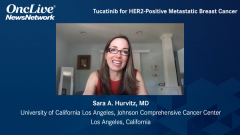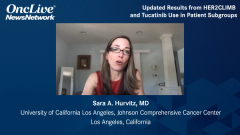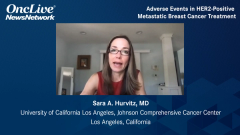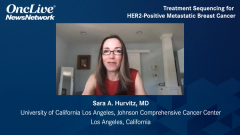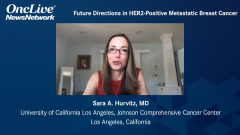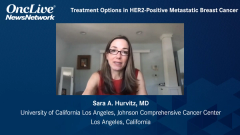
Treatment Sequencing for HER2-Positive Metastatic Breast Cancer
Sara A. Hurvitz, MD, comments on her preferences for treating patients with HER2-positive metastatic breast cancer and shares her strategy for sequencing therapies.
Episodes in this series

Sara A. Hurvitz, MD: When deciding how to sequence therapies, we don’t have clear guidance based on evidence. From a practical standpoint, if I have a patient in my clinic whose disease has progressed after T-DM1, or trastuzumab emtansine-based therapy, I will usually discuss tucatinib, capecitabine, trastuzumab, and the alternative, T-DXd [trastuzumab deruxtecan] with the patient. I explain that tucatinib is FDA approved based on a large, randomized placebo-controlled trial. Level 1 evidence supports the use of this regimen because it has been shown to improve overall survival and progression-free survival, even in patients with brain mets [metastases] and in those with visceral metastases. On the other hand, T-DXd also has very promising phase 2 data supporting it’s high level of efficacy in heavily pretreated disease. The downside to T-DXd, of course, is the risk of interstitial lung disease. So, I won’t put a patient with a history of pulmonary fibrosis or serious lung disease at baseline on T-DXd. I would pursue tucatinib instead. For a patient who has active or previously treated CNS [central nervous system] metastases, I would likely go for tucatinib as the preferred regimen first, then switch to T-DXd at the time of progression. It’s shared decision-making between myself and the patient when we decide how to sequence the therapy based on the data. I think both tucatinib-based and T-DXd–based therapy are very appropriate third-line agents. But the use of patient factors, wishes relating to adverse effects, and ability to comply with oral medications all weigh into the decision-making.
Transcript Edited for Clarity


